Myanmar’s military junta is on the ropes, but not beaten
Myanmar’s military junta is at its weakest after a series of unprecedented opposition victories, but don’t count on the return of democracy soon.
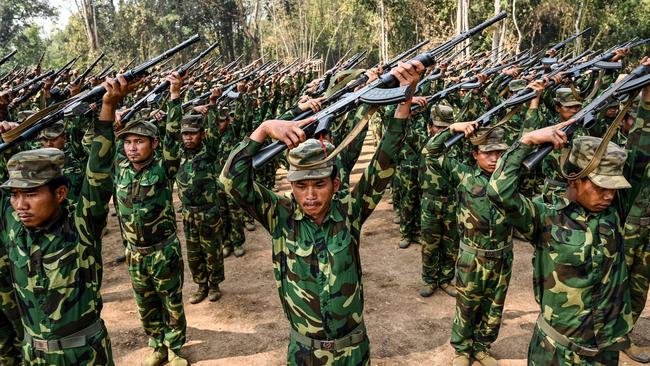
As Myanmar’s military junta staggers towards a third inglorious anniversary, predictions of its imminent collapse are being greatly exaggerated.
Stretched to breaking point the military most certainly is from a series of attacks that began with October’s Operation 1027 (named for its launch date) by the Brotherhood Alliance of ethnic armed groups in a bid to regain territory in northern Shan State and – in at least one case – control of illicit border industries.
In the 11 weeks since, the alliance of three powerful ethnic militias – the Myanmar National Democratic Alliance Army, the Ta’ang National Liberation Army and the Arakan Army – has delivered blow after humiliating blow to the junta and its “white flag” military, as it mockingly was referred to last week.
But shelve any thoughts of a New Year miracle in which Myanmar is knocked off the global list of intractable conflicts by a union of resistance forces and ethnic armed groups marching on the national capital and restoring democracy.
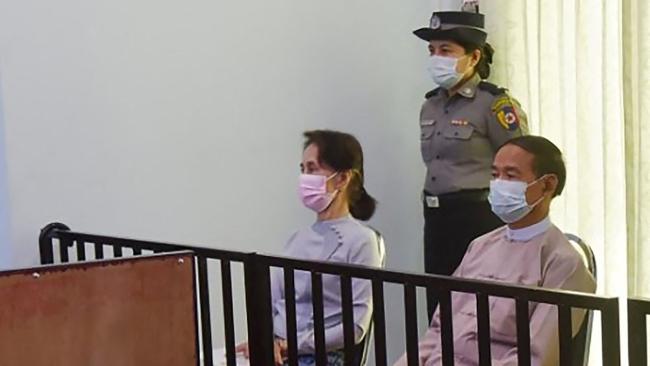
Lowy Institute research director Herve Lemahieu grew up in Myanmar and spent enough school holidays in the vice lands of Shan State to know the armed group behind Operation 1027 – the most effective challenge to the military since it toppled the Aung San Suu Kyi government in a coup on February 1, 2021 – does not have the makings of a democratic champion, let alone a selfless resistance leader.
While his father, then country head of the UN Office of Drugs and Crime, worked towards an orderly end to opium and heroin production on the border with China’s Yunnan Province, a teenage Lemahieu spent his days observing the war lords, drug kingpins, smugglers and traffickers who flourished in the autonomous Kokang region.
“It’s a parallel universe, a defacto international frontier where most Burmese people in the big cities would never dare to venture,” Lemahieu tells Inquirer.
Myanmar officially eclipsed Afghanistan last month as the largest opium producer, with 88 per cent of that production in Shan State.
A key focus of Operation 1027 was to reclaim Kokang and its main city of Laukkai, which fell last week to the MNDAA in what The Irrawaddy news website described as the “biggest military defeat in the modern history of the Myanmar military”. The militia was set up by Myanmar crime lord Peng Jiasheng, who lost the autonomous region he had ruled for decades to a mutinous deputy in 2009.
Peng, who died in 2022, had made his money first in drugs and then – under Chinese pressure to clean up the region – in casinos and gambling. But his usurper went on to build a huge network of cyber-scam operations there with the help of the Myanmar military, earning the ire of Beijing for its targeting and enslavement of thousands of Chinese citizens.
Operation 1027 is widely assumed to owe its success to the fact it committed to wiping out the cyber-scam hubs, thus earning the acquiescence – if not blessing – of Beijing, which wields huge influence over an area that operates on Chinese time, with Chinese currency and electricity.
The sophistication and scale of its attacks took the military by surprise, allowing resistance forces and other ethnic armed groups (which for years have fought the state for greater autonomy) to stage their own strikes to devastating effect in the east, west and south to stretch the junta further.
Hundreds of military outposts have been seized along with at least 17 towns and key trade routes, choking the junta’s economic lifeline and prompting the most optimistic observers to foreshadow the beginning of the end of the despised junta.
Thousands of Myanmar soldiers have surrendered or simply abandoned their posts, including as many as 400 this week who fled across the Indian border as the powerful Arakan Army seized Paletwa, a key border town in Chin State.
The strategic win means the Arakan Army controls all roads and water transport to the Indian border, and now has a base from which to plan further attacks into its home state of Rakhine, where it had been observing a ceasefire until last October.
Still, others question whether the Brotherhood Alliance has any interest in further extending itself for the good of the nation. “I think the NUG has to be careful who it decides to explicitly align with because some of these players are very unsavoury characters,” Lemahieu says of Myanmar’s parallel National Unity Government, which is made up of former MPs from the ousted Suu Kyi government and ethnic leaders.
“While they share a sort of opportunistic common enemy, the divisions between them are much greater than what unites them.
“For the Brotherhood Alliance the name of the game is territorial acquisition, not some form of participation in nation building, let alone the restoration of democracy. They might not be the best partners for that.
“These are the drug lords and warlords of the Golden Triangle. They want to reclaim lost territory and business, and that’s what this is about for them.”
Too many analysts mistakenly read Myanmar as a two-way conflict between the military and pro-democracy forces when it is more like the Syrian conflict, involving many actors with their own agenda, he adds.
In a recent post for the US Council on Foreign Relations blog, Joshua Kurlantzick calculated the odds of a combined army of independent ethnic armed groups and People’s Defence Force units (which mostly operate under NUG command) defeating the military as being the “highest since the February 2021 coup”.
“Yet many in the US government and allied governments in Europe and Asia remain unprepared for a potential collapse and the possibly chaotic weeks after,” he wrote.
“Actors with interests in Myanmar need to start planning for a day after the military collapses and the situation is economically, infrastructurally, financially, and politically unstable. No one can predict what will happen the day after the military collapses or how the most significant external power, China, will react.”
Some are now calling for the international community to formally recognise the NUG as the legitimate Myanmar government.
NUG president Duwa Lashi La told VOA last month that the battle for Myanmar had “turned in our favour” and “very quickly now, (junta leader) Min Aung Hlaing will be completely removed from leadership”.
The NUG and its People’s Defence Force units were “co-operating and co-ordinating, not only politically but also operationally” with ethnic armed groups and were fighting together in various designated military zones across the country.
“The PDF are everywhere – in the north, in the south and the central regions. If we can all co-operate to strengthen the central region, we can threaten Naypyidaw,” Duwa Lashi La said.
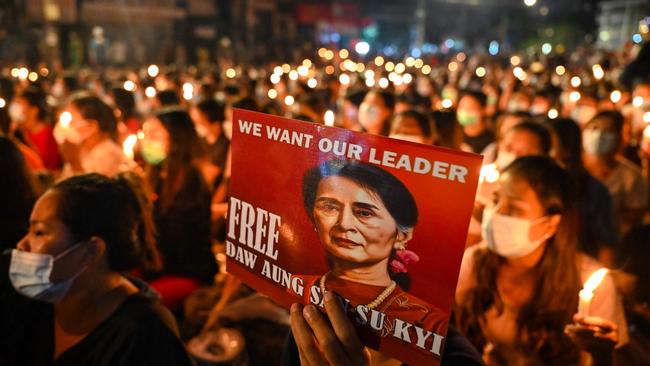
But independent Myanmar consultant David Mathieson says the NUG is dangerously overstating its role in Operation 1027, its degree of co-ordination with the Brotherhood Alliance, and its capacity to govern in the event of a wholesale junta collapse.
“You can easily tell the NUG had nothing to do with Operation 1027 for two reasons. One, it was secret. And two, it actually worked,” Mathieson says, adding some “foreign interlocutors” are frustrated the NUG does not have the political leadership capable of uniting Myanmar’s factionalised opposition.
The more the NUG claims a greater leadership role than it has, the less trusted it will be, the more resentful the ethnic armed organisations become, and the greater the likelihood of them pursuing their own agendas – potentially at the cost of the country’s disintegration.
“People really have to tamp down some of their enthusiasm because the idea there is going to be one big happy family and a post-junta utopia is completely misguided,” he says.
“I would say the military are finished in the long run given the damage that is being inflicted on them, their complete lack of legitimacy, and the fact they’ve not attempted anything credible to find a way out of this.
“They are finished in the long run, but how long is that run going to be?”
Few would mourn the end of a military junta that has killed and arrested thousands of civilians since the coup, and displaced millions more in its ongoing struggle to quash mass resistance to its rule.
The Southeast Asian nation’s economy has tanked under the junta’s control, sending millions of people back into poverty and food insecurity.
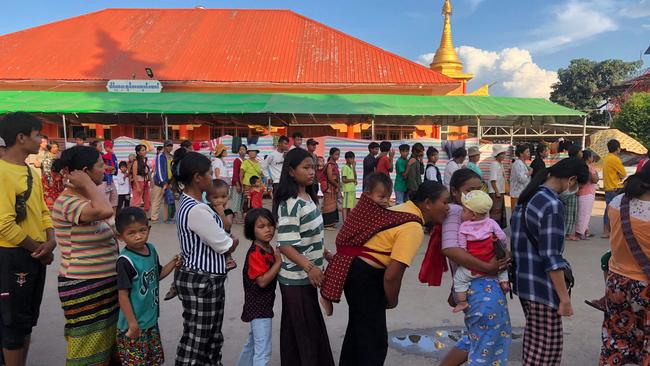
But Lemahieu and Mathieson both caution against overly sunny forecasts, given the military’s cockroach-like ability to survive hammer blows.
Notwithstanding its current weakness or the gains made by opposition forces, a clear victory by either side is unlikely given the military’s cohesion and the disunity within the resistance. Military airstrikes have accelerated rapidly in recent weeks, demonstrating the junta’s ability to dole out collective punishment has not diminished.
China’s strategic interests are also a complicating factor as Beijing seeks to tamp down conflict on its borders through domestic law enforcement encroachment.
Of all the recent developments in Myanmar, Lemahieu says China’s growing involvement should be a serious concern.
“Myanmar is becoming progressively more of an ungoverned space, no one is winning,” he tells Inquirer. “I think China has a very realistic assessment of the situation and is willing to cut deals. It isn’t likely to get involved in grand peace plans but at the margins is working to bring about the best outcome for its domestic and economic security.”
Just this week China’s foreign ministry claimed it had negotiated a formal ceasefire between the military and the Brotherhood Alliance in northern Shan State, though within hours the insurgents accused the junta of breaking that truce.
Still, there is little doubt Beijing has shifted its alignment from neutrality to support for the Kokang faction most willing to do its bidding in cracking down on scam centres.
“That is alarming because whenever we see China prosecute foreign policy through a domestic law enforcement agenda – as with its coast guard in the South China Sea – there is an inevitable mission creep. That’s what worries me here,” Lemahieu says.
“A power vacuum in Myanmar could be just as bad or worse than the junta. We all think the end of the military is good news but it depends on the circumstances. The most likely scenario is a power vacuum where no one wins, which could bring about an even more explosive environment.”
On the upside, Mathieson says Operation 1027 has generated huge optimism within a resistance movement that has borne the brunt of the military’s capacity for violence. But many also now fear greater carnage from a humiliated junta running out of options.
“We have spent the past 2½ years underestimating the brutality of the military,” Mathieson tells Inquirer. “They will bring everything down rather than give up easily, and that is what has got to be planned for.”


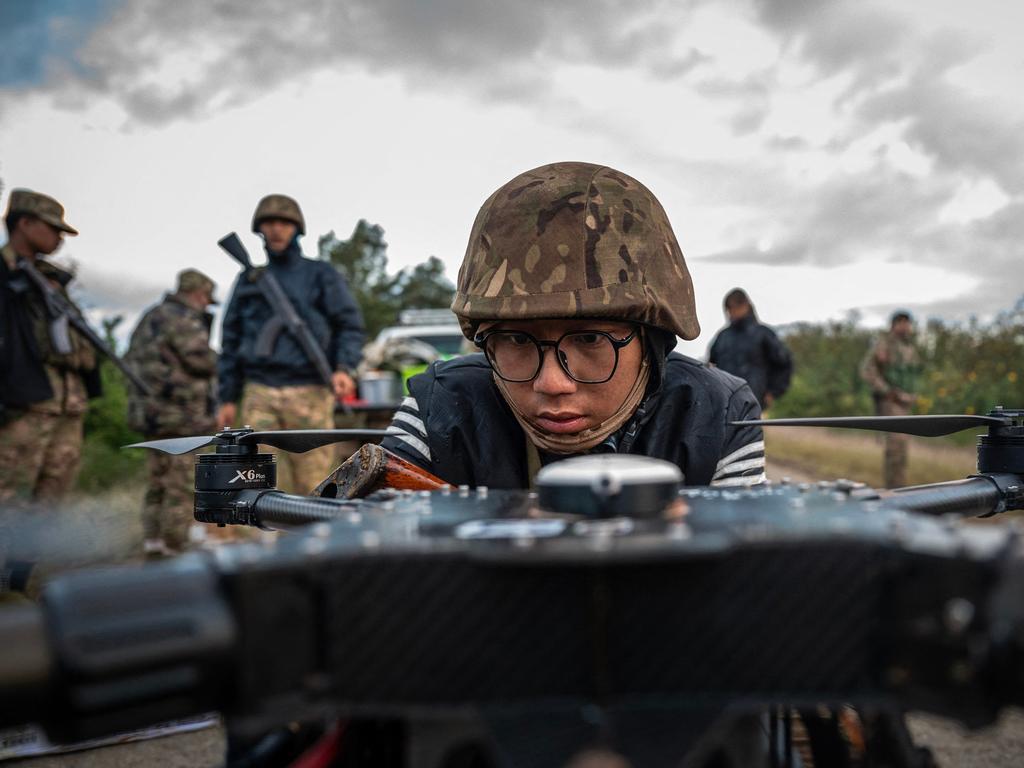
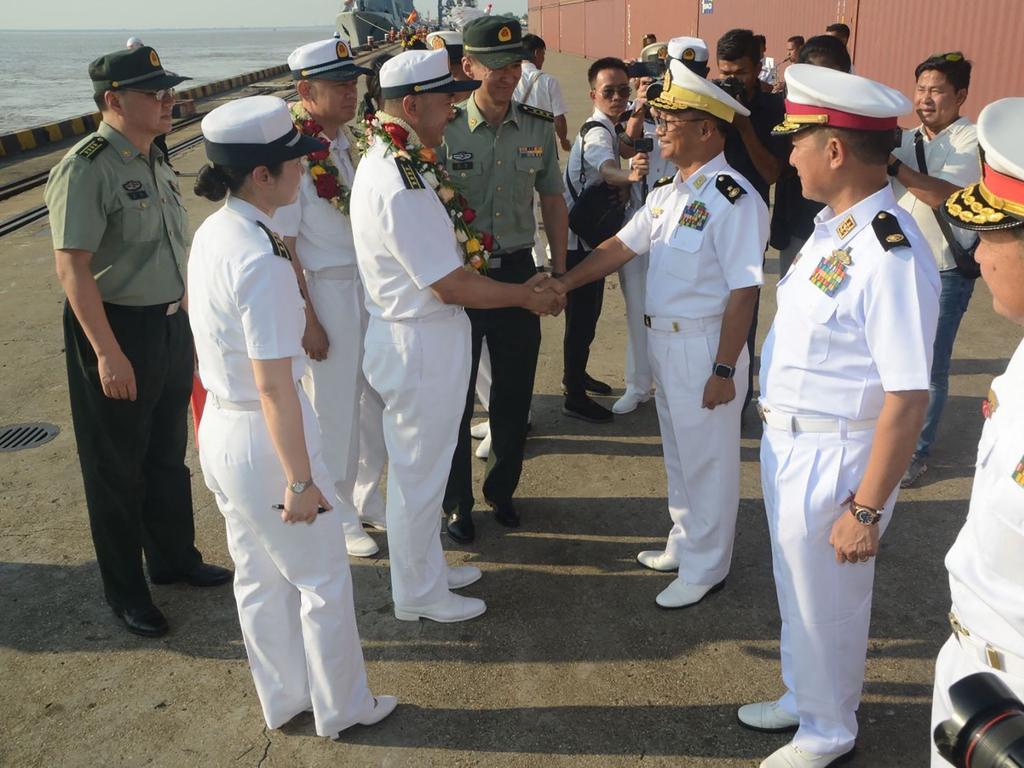

To join the conversation, please log in. Don't have an account? Register
Join the conversation, you are commenting as Logout